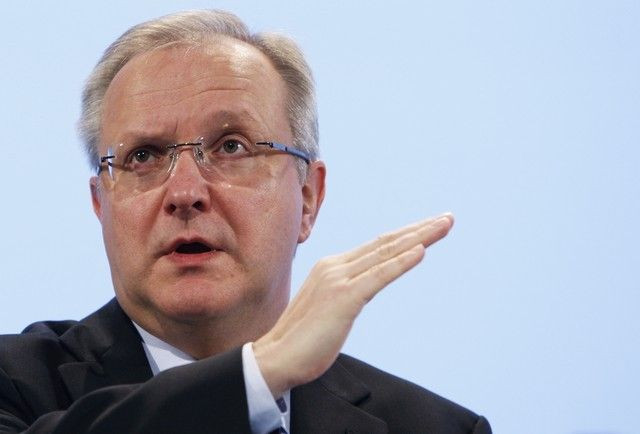European Commission Slashes Eurozone 2012 GDP Forecast, Warns of Recession

The European Commission (EC) has sharply reduced its growth forecast for the Eurozone in 2012 to 0.5 percent from 1.8 percent -- suggesting that such tepid growth would make it even more difficult for the continent to alleviate its massive debt crisis.
Growth has stalled in Europe and there is a risk of a new recession, EC commissioner Olli Rehn told reporters in Brussels.
“The outlook is unfortunately gloomy. The forecast is in fact the last wake-up call. The recovery has now come to a standstill and there’s the risk of a new recession unless determined action is taken.”
The crisis in Italy -- which is burdened with almost 2 trillion in debt and very weak economic growth -- appears to have taken center stage in Europe.
The slowdown which began at the end of 2010 now looks more like a prolonged soft patch, the Commission said.
Risks from the euro area sovereign-debt markets and the banking sector heighten this uncertainty. As such a contraction in GDP in at least one of the next few quarters cannot be ruled out.
The EC warned that in the absence of solid political changes, Italy’s public debt would likely remain at 120.5 percent of GDP next year (the same level as 2011), before slipping a bit to 118.7 percent in 2013.
The EC also estimated that Italy’s GDP will basically be flat next year, up just 0.1 percent (excluding the promises of reform recently made by Prime Minister Silvio Berlusconi).
Indeed, on Wednesday, yields on Italian 10-Year sovereign bonds climbed above 7 percent – an emergency level and considered unsustainable. On Thursday, that yield edged down to 6.98 percent.
Frederic Neumann, a senior economist with HSBC in Hong Kong, told BBC: Europe has moved from a manageable crisis in Greece to a much bigger challenge in Italy. We need radical solutions at this point to backstop the markets.
Still, the EC warned that Greece’s debt level could surge to an astounding 198.3 percent of GDP next year up from an estimated 162.8 percent in 2011. Greek GDP is also expected to contract by 2.8 percent next year.
Rehn added: Uncertainty at the current juncture is high and downside risks to the EU outlook remain particularly acute. Some elements of the downside risks to earlier forecasts – such as financial turmoil and a lower momentum of global growth - have materialized. However, new risks have emerged, and the risk balance for the EU growth outlook remains now tilted to the downside. Further financial turmoil may have more substantial spill-over effects to other market segments and the real economy. The forecast depends crucially on the assumption on current challenges being successfully addressed. Should the response to the challenges lack timeliness, clarity or ambition, a more negative development and a relapse into recession cannot be excluded.
In line with an expected weakening of the European economy, the International Energy Agency also reduced its forecast for oil demand.
The ever-present threat of a far-reaching financial collapse from the worsening quagmire in Greece and Italy generated a raft of daily headlines that injected a high level of trading volatility, the group said.
Market attention has shifted to Italy where a weak financial reform package has triggered a dangerous rise in 10-year government bonds [yields]. Oil markets are inextricably linked to the deterioration in the European debt situation given the impact on financial markets, the heightened risk of global recession, and the corresponding potential loss of oil demand.
Su-Lin Ong, a senior economist RBC Capital Markets, told media that a recession is likely in Europe.
Whatever they [Eurozone officials come up with, it doesn't avoid a European recession, she said. Increasingly, there is a risk that it spills into the banking system and becomes an issue of credit, and the lifeline of economies freezes up again.”
Britain’s GDP is expected to grow by an anemic 0.7 percent this year, followed by an even weaker 0.6 percent in 2012, the EC noted.
British Prime Minister David Cameron has expressed his alarm over the grim outlook.
The longer they [Eurozone leaders] delay, the greater the danger, he told reporters.
© Copyright IBTimes 2024. All rights reserved.





















